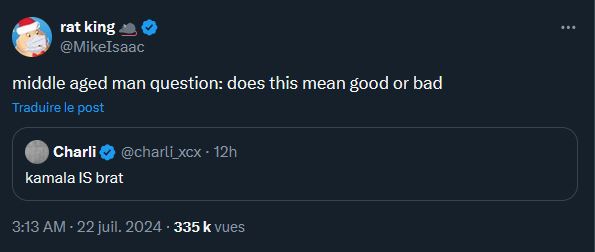(Opinion) Kamala Harris is regularly the subject of somewhat absurd memes. In France, memes from Valérie Pécresse and Marine Tondelier also punctuated the legislative elections. Why do we persist in wanting to transform political figures into memes? This is the subject of the Règle 30 newsletter this week.
On Sunday evening, Joe Biden announced that he was no longer a candidate for re-election in the presidential election scheduled for November in the United States. He then gave his support to Kamala Harris’ candidacy for the Democratic nomination. Vice-president for a few more months, she is also the former attorney general and former senator for California.
But lately, she’s mostly celebrated for inspiring a slew of online memes. Kamala Harris dancing with kids to the music of your choice ; Kamala Harris se marre (a lot) ; Kamala Harris talks about coconut trees and laughs (encore). On Sunday, she was even knighted by the current queen of the web, singer Charli XCX, who declared that « Kamala IS a brat “, referring to the title of his latest album (bratwhich means ” over » or « salt gosse ” in English).
Politics has been chasing memes for many years. While you don’t win an election by making jokes online, an organic meme can be a very effective vehicle for a politician and their agenda. It can also very quickly backfire on its source of inspiration, if they seek to profit too openly from its viral power. Memes are like weeds: they thrive best when left alone. », writes the American journalist Katie Notopoulos very rightly:. A good meme must be born almost by accident. It is both sincere and ironic. Above all, it is often terribly gendered.

This article is the editorial of the newsletter Règle 30 by Lucie Ronfaut, sent on Wednesday July 24, 2024. To receive the following issues:
The internet loves to put everyone into little boxes. Women can be ” mothers ” (a term that is pinched, like many others, to African-American and queer culture), of the ” brats » and a whole litany of « girls “. The men that Internet users are infatuated with will be treated like funny uncles, ” daddies » suave or sexy kpop singers, depending on their age. These attributes, generally attributed to stars, are gradually contaminating political communication.
American journalist Taylor Lorenz speaks of « popcraveification de l’information »in reference to Pop Crave, a famous account mostly dedicated to celebrity activities. According to her, more and more people are getting their news through viral accounts (dedicated to stars, memes, etc.) rather than consuming traditional media. It is therefore logical that politics is treated more like entertainment.
An election has always been a media circus, but something has changed
This context also applies, more and more, to France. Why not call Valérie Pécresse a “queen” because that she was filmed rolling up her sleeves ? Why not reduce Marine Tondelier to her green jacket, as if she were a stage costume ? And when left-wing activists decided to flood TikTok and Twitter/X videos in honor of NFP candidates for the legislative electionsimitating the very popular fancams in kpop, it is mainly men who have been put forward. Thus demonstrating the power of gendered (and often heterosexual) stereotypes online, but also the undervaluation of women in French political life.
We can recognize the importance for today’s politicians to adapt to new communication practices. We can also admit that there is something a little disturbing in forcing elected officials to fit into media and sexist molds, better suited to characters than real people. The depth of their political values or their position in the world does not matter, as long as the codes of the meme are respected and we have fun.
However, an election has always been a media circus to attract the attention of as many people as possible. The difference is that Internet users are now, in part, in control of the show. It is easier to laugh at politics than to believe in it.
Source: www.numerama.com


